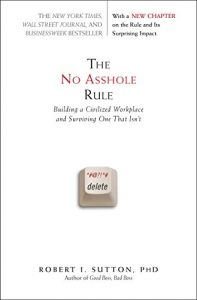
As seen on BigSpeak.com
“Eliminating the negative is the first and most important step to take in your work and rest of your life.” — Robert Sutton, Ph.D.
That tension you feel in your spine…the dread you feel as you pull into your office parking lot…the way you walk slowly towards your supervisor’s office…these are warning signs that you work with an asshole.
Robert Sutton, Ph.D., Stanford professor, organizational change expert, and bestselling author, wants to help you rid yourself of the office bully. His book The No Asshole Rule will help you verify that you work with an asshole, realize how assholes are destroying your company, and understand what you can do to handle them and save your sanity.

Diagnosing your asshole problem
What is an asshole? People use the term frequently for anyone that bothers them, but for Sutton assholes are people that use their position to create a toxic environment for you and other workers.
An asshole isn’t an “askhole” (someone who always asks for your advice and does the opposite), nor is it someone who is grumpy, having a bad day, or just has a blunt way of speaking. It’s someone who uses their power every day to make your day worse. If you’re not sure if someone is an asshole, here are two questions you should ask yourself.
1) After talking to the alleged asshole, do you feel oppressed, humiliated, de-energized, or belittled by the person? In particular, do you feel worse about yourself?
2) Does the alleged asshole aim his or her venom at people who are less powerful rather than at those people who are more powerful?
If you answered yes to both questions, your co-worker is an asshole.
If you’re still not sure, then ask yourself if you are often subjected to any of the following:
If you answered yes to one or more items on the list, then you definitely have an asshole problem.
Assholes are bad for you and your business
No one wants to be around an asshole. Besides the daily aggravation, they can ruin your career prospects and general happiness.
In a study on employees with abusive (read: asshole) supervisors, Sutton reports that employees “quit their jobs at accelerated rates, and those still trapped in their jobs suffered from less work and life satisfaction, reduced commitment to employers, and heightened depression, anxiety, and burnout.”
But assholes are not just bad for you personally, they are also bad for the business environment. Just witnessing someone being an asshole has a negative effect. According to research by Charlotte Rayner, it showed that 25 percent of bullied victims AND 20 percent of witnesses quit their jobs, compared to a typical quit rate of about 5 percent.
Assholes are even worse for a company’s operations and work environment. A study by Jerald Greenberg found when people “work for insensitive jerks, they find ways to get back at them, and stealing is one of those ways.” Furthermore, a 2008 survey by University of Florida researchers found “those with abusive supervisors put forth less effort, made more errors on purpose, hid from their bosses, and avoided making suggestions or helping co-workers.”
Finally, the daily damage of being in the presence of an asshole is hard to overcome. According to research, Sutton states “negative interactions have five times the effect on mood than positive interactions.” That means you need a lot of good things to happen in your day to make up for that one asshole.
The benefits of an asshole free workplace
While it should be obvious that an asshole free workplace is ideal, two clear benefits are less employee turnover and more commitment to the organization. It also benefits the bottom line in other ways.
Sutton points out that “Costco’s ‘shrinkage rate’ (theft by employees and customers) is only two-tenths of one percent” while “other retail chains suffer ten to fifteen times the amount” because Costco compensates their employees fairly.
Moreover, organizations that rule with compassion instead of fear “share ideas more freely, have less dysfunctional internal competition, and trump the external competition.” In effect, workplaces without assholes are not only nicer places to work, they are more financially successful.
The cure for assholes: prevention and management
If you want to cure your workplace’s asshole problem, Sutton suggests your organization have some sort of “no asshole rule” and that this rule should be “woven into hiring and firing policies.”
According to Sutton, one of the best ways to avoid assholes is to change your hiring practices. First, Sutton suggests only bringing in people who are competent for the position so you can spend all your interview time assessing the cultural fit with your company, rather than the person’s job qualifications. How good someone is at their job won’t tell you if they’re an asshole.
Second, Sutton suggests you involve more people in the hiring process. When interviewing a potential new employee, have this person meet with people above their position, below their position, and at the same level to get a sense of their personality. Also make sure you have very few assholes on the hiring committee, since like attracts like, assholes tend to hire other assholes.
Furthermore, an organization’s “no asshole rule” should extend to everyone. According to Sutton, “organizations that are serious about enforcing the no asshole rule apply it to customers, clients, students, and everyone else encountered on the job, not just employees.” At Gold’s Gym for example, the philosophy is you can fire abusive customers and have them go to another gym.
Finally, the way to keep this rule working is also to make sure that bad behavior is not rewarded. According to Sutton, if people see assholes are not “rewarded for their actions, other organization members will be more diligent about adhering to the no asshole rule.”
Dealing with assholes, if you can’t leave
Of course, you may already be working with an asshole. So what should you do if you currently have an asshole problem? Sutton advises that if you work for an asshole, you should leave right away, if possible.
However, he realizes that not everyone can leave their job. Therefore, if you must work for an asshole for the duration, he has some coping techniques for you.
First, Sutton suggests you can reframe the situation. View the situation as temporary and don’t blame yourself for what is happening.
Second, you can practice indifference and emotional detachment. According to Sutton, “When your job feels like a prolonged personal insult, focus on just going through the motions, on caring as little as possible about the jerks around you, and think about something more pleasant as often as you can.”
If you practice these techniques, you can protect your mental and physical health until the situation changes or you find a better job.
However, the best cure for assholes is preventing them from working in your organization in the first place.
Kyle Crocco is the Content Marketing Coordinator at BigSpeak Speakers Bureau, a graduate of UC Santa Barbara, and the lead singer of Duh Professors. He regularly publishes business book reviews and thought articles on Medium, Business 2 Community, and Born 2 Invest.
Complete this easy form to be connected with top keynote speaker consultants in the speaking industry. Within 24 hours, an expert event consultant will be in touch with you to locate the best keynote speaker for your event. No pressure, no tactics - just expert advice on how to select the perfect keynote speaker for your upcoming event.